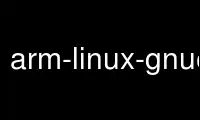
This is the command arm-linux-gnueabi-strings that can be run in the OnWorks free hosting provider using one of our multiple free online workstations such as Ubuntu Online, Fedora Online, Windows online emulator or MAC OS online emulator
PROGRAM:
NAME
strings - print the strings of printable characters in files.
SYNOPSIS
strings [-afovV] [-min-len]
[-n min-len] [--bytes=min-len]
[-t radix] [--radix=radix]
[-e encoding] [--encoding=encoding]
[-] [--all] [--print-file-name]
[-T bfdname] [--target=bfdname]
[-w] [--include-all-whitespace]
[-s] [--output-separatorsep_string]
[--help] [--version] file...
DESCRIPTION
For each file given, GNU strings prints the printable character sequences that are at
least 4 characters long (or the number given with the options below) and are followed by
an unprintable character.
Depending upon how the strings program was configured it will default to either displaying
all the printable sequences that it can find in each file, or only those sequences that
are in loadable, initialized data sections. If the file type in unrecognizable, or if
strings is reading from stdin then it will always display all of the printable sequences
that it can find.
For backwards compatibility any file that occurs after a command line option of just -
will also be scanned in full, regardless of the presence of any -d option.
strings is mainly useful for determining the contents of non-text files.
OPTIONS
-a
--all
- Scan the whole file, regardless of what sections it contains or whether those sections
are loaded or initialized. Normally this is the default behaviour, but strings can be
configured so that the -d is the default instead.
The - option is position dependent and forces strings to perform full scans of any
file that is mentioned after the - on the command line, even if the -d option has been
specified.
-d
--data
Only print strings from initialized, loaded data sections in the file. This may
reduce the amount of garbage in the output, but it also exposes the strings program to
any security flaws that may be present in the BFD library used to scan and load
sections. Strings can be configured so that this option is the default behaviour. In
such cases the -a option can be used to avoid using the BFD library and instead just
print all of the strings found in the file.
-f
--print-file-name
Print the name of the file before each string.
--help
Print a summary of the program usage on the standard output and exit.
-min-len
-n min-len
--bytes=min-len
Print sequences of characters that are at least min-len characters long, instead of
the default 4.
-o Like -t o. Some other versions of strings have -o act like -t d instead. Since we
can not be compatible with both ways, we simply chose one.
-t radix
--radix=radix
Print the offset within the file before each string. The single character argument
specifies the radix of the offset---o for octal, x for hexadecimal, or d for decimal.
-e encoding
--encoding=encoding
Select the character encoding of the strings that are to be found. Possible values
for encoding are: s = single-7-bit-byte characters (ASCII, ISO 8859, etc., default), S
= single-8-bit-byte characters, b = 16-bit bigendian, l = 16-bit littleendian, B =
32-bit bigendian, L = 32-bit littleendian. Useful for finding wide character strings.
(l and b apply to, for example, Unicode UTF-16/UCS-2 encodings).
-T bfdname
--target=bfdname
Specify an object code format other than your system's default format.
-v
-V
--version
Print the program version number on the standard output and exit.
-w
--include-all-whitespace
By default tab and space characters are included in the strings that are displayed,
but other whitespace characters, such a newlines and carriage returns, are not. The
-w option changes this so that all whitespace characters are considered to be part of
a string.
-s
--output-separator
By default, output strings are delimited by a new-line. This option allows you to
supply any string to be used as the output record separator. Useful with
--include-all-whitespace where strings may contain new-lines internally.
@file
Read command-line options from file. The options read are inserted in place of the
original @file option. If file does not exist, or cannot be read, then the option
will be treated literally, and not removed.
Options in file are separated by whitespace. A whitespace character may be included
in an option by surrounding the entire option in either single or double quotes. Any
character (including a backslash) may be included by prefixing the character to be
included with a backslash. The file may itself contain additional @file options; any
such options will be processed recursively.
Use arm-linux-gnueabi-strings online using onworks.net services